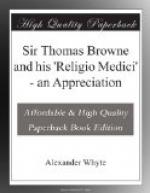The title, at least, of the Urn-Burial is more familiar to the most of us than that of the Pseudodoxia. It was the chance discovery of some ancient urns in Norfolk that furnished Sir Thomas with the occasion to write his Hydriotaphia. And that classical book is only another illustration of his enormous reading, ready memory, and intense interest in everything that touches on the nature of man, and on his beliefs, habits, and hopes in all ages of his existence on this earth. And the eloquence and splendour of this wonderful piece is as arresting to the student of style as its immense information is to the scholar and the antiquarian. ‘The conclusion of the essay on Urn-Burial,’ says Carlyle, ’is absolutely beautiful: a still elegiac mood, so soft, so deep, so solemn and tender, like the song of some departed saint—an echo of deepest meaning from the great and mighty Nations of the Dead. Sir Thomas Browne must have been a good man.’
The Garden of Cyrus is past all description of mine. ’The Garden of Cyrus must be read. It is an extravagant sport of a scholar of the first rank and a genius of the first water. ‘We write no herbal,’ he begins, and neither he does. And after the most fantastical prose-poem surely that ever was written, he as fantastically winds up at midnight with this: ’To keep our eyes longer open were but to act our antipodes. The huntsmen are up in America, and they are already past their first sleep in Persia.’ At which Coleridge must incontinently whip out his pencil till we have this note of his on the margin: ’What life! what fancy! what whimsicality! Was ever such a reason given for leaving one’s book and going to bed as this, that they are already past their first sleep in Persia, and that the huntsmen are up in America?’
Sir Thomas Browne has had many admirers, and his greatest admirers are to be found among our foremost men. He has had Samuel Johnson among his greatest admirers, and Coleridge, and Carlyle, and Hazlitt, and Lytton, and Walter Pater, and Leslie Stephen, and Professor Saintsbury; than whom no one of them all has written better on Browne. And he has had princely editors and annotators in Simon Wilkin, and Dr. Greenhill, and Dr. Lloyd Roberts. I must leave it to those eminent men to speak to you with all their authority about Sir Thomas Browne’s ten talents: his unique natural endowments, his universal scholarship, his philosophical depth, ’his melancholy yet affable irony,’ his professional and scientific attainments, and his absolutely classical English style. And I shall give myself up, in ending this discourse, to what is of much more importance to him and to us all, than all these things taken together,—for Sir Thomas Browne was a believing man, and a man of unfainting and unrelaxing prayer. At the same time, and assuming, as he does, and that without usurpation, as he says, the style of a Christian, he is in reality




